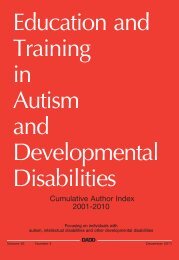Download the Journal (PDF) - Division on Autism and ...
Download the Journal (PDF) - Division on Autism and ...
Download the Journal (PDF) - Division on Autism and ...
You also want an ePaper? Increase the reach of your titles
YUMPU automatically turns print PDFs into web optimized ePapers that Google loves.
TABLE 6<br />
Questi<strong>on</strong> Generati<strong>on</strong> by Element of a Story<br />
Participants<br />
<str<strong>on</strong>g>the</str<strong>on</strong>g> computer?”). By <str<strong>on</strong>g>the</str<strong>on</strong>g> end of interventi<strong>on</strong>,<br />
Barry used a number of questi<strong>on</strong> words, <strong>and</strong><br />
<strong>on</strong>ly received prompting when questi<strong>on</strong>s did<br />
not reflect <str<strong>on</strong>g>the</str<strong>on</strong>g> element of a story.<br />
Chris. In comparis<strong>on</strong> to o<str<strong>on</strong>g>the</str<strong>on</strong>g>r children with<br />
ASD, Chris dem<strong>on</strong>strated <str<strong>on</strong>g>the</str<strong>on</strong>g> highest percentage<br />
of unprompted questi<strong>on</strong>s when asking<br />
about a problem <strong>and</strong> <str<strong>on</strong>g>the</str<strong>on</strong>g> lowest percentage<br />
when asking about characters <strong>and</strong> events (see<br />
Table 6). Chris’s difficulty forming character<br />
questi<strong>on</strong>s was a result of using “who” <strong>and</strong><br />
“what” questi<strong>on</strong> words interchangeably, “Who<br />
is mommy doing?” Chris relied primarily <strong>on</strong><br />
modeling to ask a questi<strong>on</strong> during beginning<br />
sessi<strong>on</strong>s. By sessi<strong>on</strong> 6, he was c<strong>on</strong>sistently asking<br />
more unprompted than prompted questi<strong>on</strong>s<br />
during reading. During initial sessi<strong>on</strong>s,<br />
Chris used a lot of self-talk, “I can ask an<br />
element. Setting is an element.” By <str<strong>on</strong>g>the</str<strong>on</strong>g> end of<br />
sessi<strong>on</strong> 5, Chris asked his first specific problem<br />
questi<strong>on</strong>, “Why did Muffy trip <str<strong>on</strong>g>the</str<strong>on</strong>g> brain?”<br />
Throughout <str<strong>on</strong>g>the</str<strong>on</strong>g> interventi<strong>on</strong>, Chris progressively<br />
asked more specific questi<strong>on</strong>s reflecting<br />
story c<strong>on</strong>tent, “Why is <str<strong>on</strong>g>the</str<strong>on</strong>g>ir house all messy?”<br />
Self-talk remained prominent, but instances<br />
of failing to ask a questi<strong>on</strong> decreased steadily<br />
after sessi<strong>on</strong> eight. At <str<strong>on</strong>g>the</str<strong>on</strong>g> end of <str<strong>on</strong>g>the</str<strong>on</strong>g> interventi<strong>on</strong>,<br />
Chris c<strong>on</strong>tinued to use “who” <strong>and</strong> “what”<br />
questi<strong>on</strong> words interchangeably.<br />
Unprompted Resp<strong>on</strong>ses<br />
Characters Setting Event Problem Soluti<strong>on</strong> Totals<br />
UP P UP P UP P UP P UP P UP P<br />
Figure 5 shows <str<strong>on</strong>g>the</str<strong>on</strong>g> frequency of unprompted<br />
resp<strong>on</strong>ses by each child. Immediately after interventi<strong>on</strong><br />
began, general educati<strong>on</strong> peers increased<br />
questi<strong>on</strong> generati<strong>on</strong>. Because <str<strong>on</strong>g>the</str<strong>on</strong>g> interventi<strong>on</strong><br />
involved reciprocal questi<strong>on</strong>ing,<br />
<str<strong>on</strong>g>the</str<strong>on</strong>g> resp<strong>on</strong>ses of <str<strong>on</strong>g>the</str<strong>on</strong>g> children with ASD were<br />
Total #<br />
Generated<br />
Cole 11 2 12 1 16 8 4 6 0 2 43 19 62<br />
Cole’s Ps 23 2 2 2 6 13 6 8 0 1 36 26 63<br />
Dean 1 1 1 2 9 6 17 4 0 4 28 17 45<br />
Dean’s Ps 3 2 5 0 12 14 7 4 1 0 28 20 48<br />
Nate 3 7 3 1 13 9 9 3 1 5 29 25 54<br />
Nate’s Ps 6 5 7 2 13 7 15 5 0 0 30 30 60<br />
380 / Educati<strong>on</strong> <strong>and</strong> Training in Developmental Disabilities-September 2008<br />
highly dependent <strong>on</strong> questi<strong>on</strong>s posed by general<br />
educati<strong>on</strong> peers. That is, all three children<br />
with ASD show a general pattern of increased<br />
unprompted resp<strong>on</strong>ses with an<br />
increase in <str<strong>on</strong>g>the</str<strong>on</strong>g> questi<strong>on</strong>s posed by peers, although<br />
with individual variati<strong>on</strong>s in relati<strong>on</strong><br />
to c<strong>on</strong>sistency. The number of times participants<br />
with ASD resp<strong>on</strong>ded to questi<strong>on</strong>s generated<br />
by peers without prompting ranged<br />
from 2–6, 1–6 <strong>and</strong> 1–5 for Austin, Barry <strong>and</strong><br />
Chris respectively.<br />
Participants with ASD <strong>and</strong> <str<strong>on</strong>g>the</str<strong>on</strong>g>ir general educati<strong>on</strong><br />
peers had <str<strong>on</strong>g>the</str<strong>on</strong>g> opportunity to resp<strong>on</strong>d<br />
to a variety of questi<strong>on</strong>s focusing <strong>on</strong> each of<br />
<str<strong>on</strong>g>the</str<strong>on</strong>g> 5 elements of a story (see Table 7). The<br />
proporti<strong>on</strong> of unprompted versus prompted<br />
resp<strong>on</strong>ses was variable. Participants with ASD<br />
<strong>and</strong> <str<strong>on</strong>g>the</str<strong>on</strong>g>ir peers received <str<strong>on</strong>g>the</str<strong>on</strong>g> least amount of<br />
prompting when resp<strong>on</strong>ding to character <strong>and</strong><br />
setting questi<strong>on</strong>s. Resp<strong>on</strong>ses to problem questi<strong>on</strong>s<br />
showed greater variability. Fur<str<strong>on</strong>g>the</str<strong>on</strong>g>r, soluti<strong>on</strong><br />
questi<strong>on</strong>s were asked very infrequently by<br />
participants, making it difficult to note any<br />
patterns in resp<strong>on</strong>ding behavior. Very few participants<br />
failed to resp<strong>on</strong>d or resp<strong>on</strong>ded with<br />
“I d<strong>on</strong>’t know.”<br />
Questi<strong>on</strong>s that required a resp<strong>on</strong>se bey<strong>on</strong>d<br />
text recall required prompting more often<br />
than resp<strong>on</strong>ses directly found in text. That is,<br />
if a resp<strong>on</strong>se required interpretati<strong>on</strong> of a character’s<br />
behavior or summarizing a character’s<br />
acti<strong>on</strong>s or events, <str<strong>on</strong>g>the</str<strong>on</strong>g> need for prompting increased.<br />
For example, in <str<strong>on</strong>g>the</str<strong>on</strong>g> story Arthur Goes<br />
to Camp, Rocky (<str<strong>on</strong>g>the</str<strong>on</strong>g> boy’s camp counselor) is<br />
yelling at <str<strong>on</strong>g>the</str<strong>on</strong>g> boys about <str<strong>on</strong>g>the</str<strong>on</strong>g>ir physical shape.<br />
Earlier in <str<strong>on</strong>g>the</str<strong>on</strong>g> story, references were made<br />
about sporting competiti<strong>on</strong>s between <str<strong>on</strong>g>the</str<strong>on</strong>g> boys<br />
<strong>and</strong> girls camps, <strong>and</strong> Rocky is yelling at <str<strong>on</strong>g>the</str<strong>on</strong>g>
















